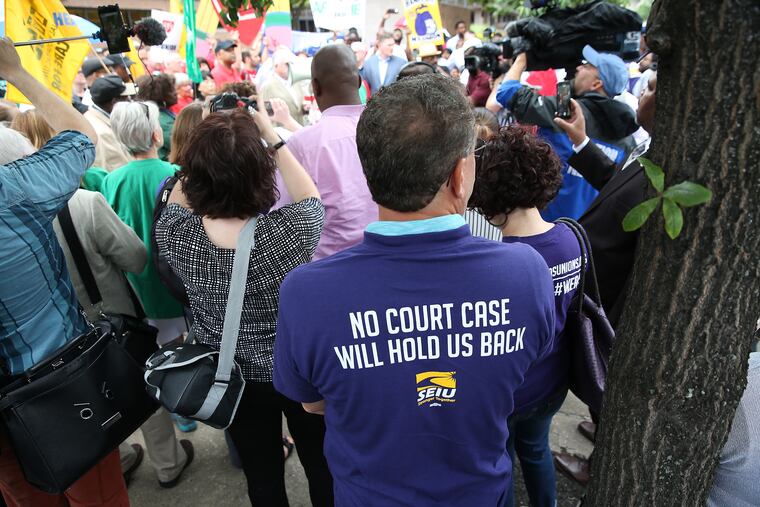Workers’ rights more important than ever this election | Opinion
Voters in Pennsylvania have a choice of vision on workers' rights this November.

Much attention has rightfully been paid to Supreme Court nominee Brett Kavanaugh's stance on abortion and women's health, which will face even more scrutiny now that accusations of sexual misconduct have been levied against him. However, the judicial nominee also has an equally distressing record on workers' rights. This should sound alarm bells for union members and all hard-working Pennsylvanians in the wake of the Janus decision, which prevented unions from receiving dues from workers that they represent.
Before Janus, workers' rights were balanced with the right of individuals to not pay for the political activities of unions if the individual disagreed with them. Public sector workers had no requirement to join unions, but in waving membership, they also waved the union's representation. Janus creates a scenario in which employees can choose whether they want to pay for these services but still receive them for free. Essentially, public sector unions could quickly face a funding nightmare that will jeopardize their ability to fight for workers.
Kavanaugh's fate as a Supreme Court justice will be decided in the coming weeks. Regardless of the outcome, though, voters in Pennsylvania have a choice of vision on workers' rights this November. Several of Pennsylvania's GOP representatives in Harrisburg have introduced bills since Janus that will further decimate the ability of unions to protect themselves.
Look no further than Rep. Kate Klunk (R., York County), whose H.B. 2157 would effectively codify the Janus decision into state law by making amendments to the Public Employee Relations Act. Additionally, the legislation would require employers to send notification to workers each pay period that being in a union and paying dues is not a requirement of employment and prevent payroll deductions for voluntary contributions by non-union members.
When we have strong unions, wages go up. It's as simple as that. Look at the graph of real wages since the 1950s. During the 1930s and '40s, when unions were very strong and membership was high, real wages are high. Since then, real wages have decreased in near straight-line fashion.
Janus strikes a blow at unions by depriving them of resources while stripping them of their power to collect dues from members who benefit from their collective bargaining. In a post-Janus era, other workers within a public sector union would be able to form competing unions or represent themselves individually, giving employers an upper hand at the bargaining table and creating a divide-and-conquer scenario that diminishes workers' power to get fair terms and conditions of employment, such as a 40-hour workweek, full health care, and pensions.
While Republican House members in Pennsylvania have abandoned workers, Democrats in the House can and will continue to push for legislation that other states have already put on the books. In California and New York, recent bills have given unions the opportunity to communicate with employees during orientation. Further, if Janus becomes codified in Pennsylvania, the legislature should consider ensuring unions have what is seemingly a basic right: the ability to refuse representation to workers who don't pay dues.
Efforts to strip unions of their power will continue, and the biggest battle over so-called "right to work" legislation is likely just around the corner in our Commonwealth. In the meantime, voters should be wary of taking unions for granted. That means paying attention to who represents them and making their voices heard loud and clear this November at the ballot box. Now is the time workers should unite and demand higher wages. The data clearly show that the rich have been getting richer while the poor and working class of our country have less money in their pockets year after year. We unite by standing in solidarity with each other, and when we fight, we win.
Joe Hohenstein is a lifelong resident of Frankford. He is the Democratic nominee for State Representative in Pennsylvania's 177th District, covering lower Northeast Philadelphia and the river wards.